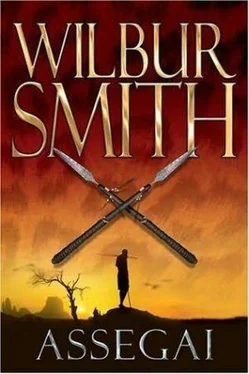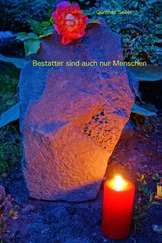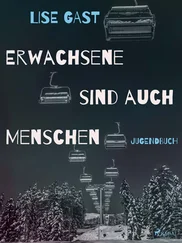Several hundred older men, with women and children, lined the outer stockade to watch the dance. The women clapped and ululated. As the three whites rode into the manyatta the drums took on an ever more savage and frenetic rhythm. The drummers pounded on the hollow logs, working the warriors into a fighting frenzy until they broke into the lion dance, singing and bounding high in the air on stiff legs, grunting like lions as they came back to earth.
Then the leader blew a shrill command on his whistle and the troop began to sally forth from the cattle pen, retaining their single file. Evenly spaced, they formed a long, sinuous serpent, which wound away down the grassy slope, the sunlight reflecting in bright sparks off the steel of their assegais . They carried on their shoulders their long rawhide shields, each painted with a single large eye of black and ochre, the pupil glaring white.
‘Why do they have eyes on their shields, Otto?’ Eva asked.
‘Answer the question, Courtney.’
‘The morani say they will provoke the lions into charging. Come, we must not be left behind. When it happens, it will happen very fast.’ The riders followed the long, winding file of warriors.
‘How do they know where to find the quarry?’ Graf Otto asked.
‘They have scouts watching over the lions,’ Leon answered. ‘But the lions will not have gone far. They have killed six cattle, and they will not leave until they have finished all that meat.’
Manyoro was running at Leon’s stirrup. He said something and Leon stooped in the saddle to listen to him. When he straightened up he told Graf Otto, ‘Manyoro says the dead cattle are lying in a shallow basin over the next rise.’ He pointed ahead. ‘If we circle out to the right, and take up position on the high ground, we will have a grandstand view.’ He led them off the track and they cantered in a wide circle to get ahead of the file of morani , reaching the lookout point as the head of the long line of warriors breasted the ridge and started down into the basin.
Manyoro had given them good advice. When they reined in on the crest, they had a fine view over the grassy dale. The rotting carcasses of the cattle lay in full view, bellies ballooned with gas. Some had been partially devoured, but others seemed untouched.
Now the single file of warriors changed formation. As they reached a predetermined spot, each morani turned in the opposite direction to the man in front of him. Like a chorus line of well-choreographed dancers, the single file split into two. The twin lines opened to form a noose that would encircle the grassy hollow. Then, at a sharp blast on the whistle, the heads of the files of warriors began to converge. Swiftly the manoeuvre was completed. A wall of shields and spears ringed the basin.
‘I cannot see the lions,’ Eva said. ‘Are you sure they have not escaped?’
But before either man could answer her, a lion stood up in full view. He had been lying flat against the earth, his coat blending perfectly with the sun-scorched brown grass. Although he was young, he was big and rangy. His mane was short and sparse, a mere fuzz of red hair. He snarled at the morani , his lips peeling back from his long, bright fangs.
They returned his greeting: ‘We see you, evil one! We see you, killer of our cattle.’
The sound of fifty voices alarmed the other lions. They rose from their hiding places in the short grass, crouched low and glared, with eyes of topaz yellow, at the ring of shields. Their tails twitched nervously, they snarled and growled with fear and anger. They were young and this was beyond their experience.
The buckhorn whistle shrilled again and the morani began to chant the chorus of the Lion Song. Then, still singing, they moved forward in unison, shuffling and stamping. Slowly they closed in on the four lions as a python tightens its coils on its prey. One lion made a short mock-charge at the wall, and the morani shook their shields and called to him, ‘Come! Come! We are ready to welcome you!’
The lion broke off his charge, coming up short on stiff front legs. He glared at the men, then spun around and ran back to join his siblings. They circled and milled uneasily, growling, and erected their manes in a threatening display, making short rushes at the wall of shields, then breaking off and turning back.
‘The one with the ginger mane will be the first to charge home.’ Graf Otto made his judgement and, as he spoke, the largest of the four lions launched himself in a swift, determined charge, straight at the shields. The senior morani , with the black-mane headdress, blew a blast on his buckhorn whistle. Then, with his spear, he pointed out a man in the file who was directly in the line of the charge. He shouted the man’s name: ‘Katchikoi!’
The warrior who had been chosen sprang high in the air to acknowledge the honour, then broke out of the line and raced to meet the charging lion with long, bounding strides. His comrades egged him on with a savage, rising ululation. The lion saw him coming, and swerved towards him, grunting with each stride, a tawny streak snaking low against the ground, his black-tufted tail slashing against his flanks. His glittering yellow eyes were fastened on Katchikoi.
As they came together the morani altered the angle of his charge, turning into the lion, forcing him to come in from the right, into his spear arm. Then he dropped on one knee behind his shield. The point of his assegai was aimed at the centre of the lion’s chest, and the beast ran straight on to the steel. The long silver blade disappeared with magical suddenness, full length into the tawny body. Katchikoi released his grip on the haft, leaving the blade buried in the lion’s chest. He raised the rawhide shield and the lion crashed headlong into it. He did not try to resist the weight and momentum of the great cat’s leap, instead he rolled over backwards and curled himself into a ball holding the shield interposed. Despite the assegai , which transfixed him, the lion’s strength and rage were undiminished. He tore at the shield with both front paws, the yellow claws raking deep gouges in it. He was growling hideously and trying to bite into the shield, but the leather had dried iron-hard and his fangs could not find a grip.
The hunt master blew a short blast on his buckhorn and four of Katchikoi’s comrades left the ring of warriors and raced forward, then separated, two on each side. The lion was concentrating all his effort on Katchikoi so he did not see them coming until they had him surrounded. Their assegais rose and fell as, repeatedly, they drove the long blades deep into the lion’s vital organs. The beast gave a mighty groan that carried clearly to the horsemen on the rise, then collapsed and rolled off the shield. He stretched out and lay still.
Katchikoi sprang to his feet, seized the handle of his assegai , placed one foot on the lion’s chest and drew the blade clear. Brandishing the bloody steel, he led his four companions back to their places in the ring of warriors. They were greeted with shouts of acclamation that seemed to ring against the sky, and a salute of raised spears. Then the ring of morani moved forward again, tight-ening inexorably around the remaining three lions. As the ring contracted the warriors compacted into a solid wall, the outer edges of their shields overlapping.
In the centre the three lions rushed back and forth, seeking escape. They charged, then broke off and turned back with tails between their legs. At last one screwed its courage to the fatal point and charged home. The morani who met him drove the blade of his assegai fully home, but as he went over backwards with the lion on top, its claws hooked around the edge of the shield and ripped it aside, exposing the man’s head and his naked torso. While its claws tore the man’s chest open, the mortally wounded lion opened its jaws to their full extent and engulfed the man’s head. It bit down until the long fangs interlocked, crushing the human skull like a walnut in a nutcracker. The dead man’s comrades speared the lion in a fury of vengeance.
Читать дальше












